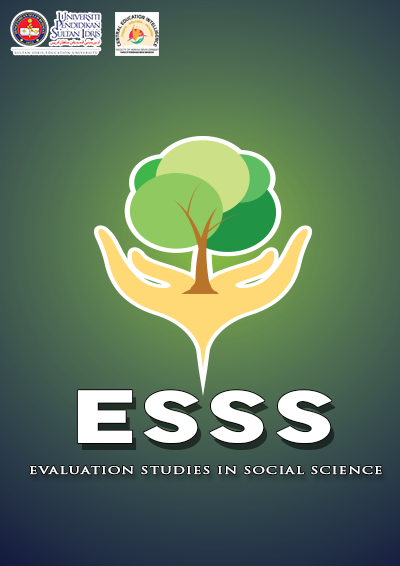Instructional Leadership through Action Research: A Case Study of an Excellent Principal
DOI:
https://doi.org/10.37134/esss.vol2.2.2.2021Keywords:
Action research, instructional leadership, teaching strategies, instructional coachingAbstract
Action Research (AR) is a method to help teachers to make improvements to teaching practices. Thus, this study aims to explore and understand how an excellent principal uses AR as an instructional leadership tool in an effort to develop teachers’ competencies. Since the study aims to explore and understand the researcher have choosen a qualitative research design. Data collection was done using semi-structured interview method and analysis of several related documents. The data were analyzed thematically where themes were developed based on the research questions that had been constructed. Among the themes obtained is that this excellent principal had used AR as an instructional leadership tool to plan and develop instructional program, ensure teachers teaching strategies bring positive implications on students learning and finally through AR instructional guidance can be carried out. Since this research has been conducted from the perpective of the teachers. This is because tecahers are the implementing agents and will have different perceptions when compared to school leaders.
Downloads
References
Alpaydin, E., & Kaynak, C. (1998). Cascading classifiers. Kybernetika, 34(4), 369-374.
Abduraxmanovich, J. U. (2020). Modeling the pedagogical experience of England as a factor of improving the quality of training future teachers. International Journal of Psychosocial Rehabilitation, 24(04).
Amin, D. R. A., & Hamzah, M. I. M. (2021). Tahap amalan kepimpinan instruksional guru besar dan hubungannya dengan tahap komitmen guru. Malaysian Journal of Social Sciences and Humanities (MJSSH), 6(2), 135-151.
Arumugham, K. S. (2020). Kurikulum, pengajaran dan pentaksiran dari perspektif pelaksanaan pentaksiran bilik darjah. Asian People Journal (APJ), 3(1), 152-161.
Baturay, M. H., Gökçearslan, Ş., & Ke, F. (2017). The relationship among pre-service teachers' computer competence, attitude towards computer-assisted education, and intention of technology acceptance. International Journal of Technology Enhanced Learning, 9(1), 1-13.
Braun, V., Clarke, V., & Hayfield, N. (2019). ‘A starting point for your journey, not a map’: Nikki Hayfield in conversation with Virginia Braun and Victoria Clarke about thematic analysis. Qualitative Research in Psychology, 1-22.
Creswell, J. W. (2017). CUSTOM: CEC edition qualitative inquiry and research design. SAGE Publications.
Desimone, L. M., & Pak, K. (2017). Instructional coaching as high-quality professional development. Theory into practice, 56(1), 3-12.
Eisner, E. W. (2017). The enlightened eye: Qualitative inquiry and the enhancement of educational practice. Teachers College Press.
Elstad, E., & Christophersen, K. A. (2017). Perceptions of digital competency among student teachers: Contributing to the development of student teachers’ instructional self-efficacy in technology-rich classrooms. Education Sciences, 7(1), 27.
Galimullina, A., Galimullin, F. G., Meliksetyan, V., & Kayumova, G. (2019). The role of interactive technologies in training future teachers of Russian literature. ARPHA Proceedings, 1, 181.
Gillard, J. W. (2018). An initial analysis and reflection of the metrics used in the Teaching Excellence Framework in the UK. Perspectives: Policy and Practice in Higher Education, 22(2), 49-57.
Kim, M. K., Xie, K., & Cheng, S. L. (2017). Building teacher competency for digital content evaluation. Teaching and Teacher Education, 66, 309-324.
Laudonia, I., Mamlok-Naaman, R., Abels, S., & Eilks, I. (2018). Action research in science education–an analytical review of the literature. Educational Action Research, 26(3), 480-495.
Lewin, K. (1946). Action research and minority problems. Journal of Social Issues, 2(4), 34-46.
Manfra, M. M. (2019). Action research and systematic, intentional change in teaching practice. Review of Research in Education, 43(1), 163-196.
Mei Kin, T., Abdull Kareem, O., Nordin, M. S., & Wai Bing, K. (2018). Principal change leadership competencies and teacher attitudes toward change: the mediating effects of teacher change beliefs. International Journal of Leadership in Education, 21(4), 427-446.
Mu, G. M., Liang, W., Lu, L., & Huang, D. (2018). Building pedagogical content knowledge within professional learning communities: An approach to counteracting regional education inequality. Teaching and Teacher Education, 73, 24-34.
Sasmal, I. H., & Pande, M. H. (2018). Action research through mentorship model: A sustainable framework for professional development. 2 Dear Reader, 60(5), 25.
Schreier, M. (2018). Sampling and generalization. The Sage handbook of qualitative data collection, 84-98.
Shogren, K. A., Raley, S. K., Rifenbark, G. G., Lane, K. L., Bojanek, E. K., Karpur, A., & Quirk, C. (2021). The Self-Determined Learning Model of Instruction: Promoting implementation fidelity. Inclusion, 9(1), 46-62.
Szeto, E., & Cheng, A. Y. N. (2018). Principal–teacher interactions and teacher leadership development: Beginning teachers’ perspectives. International Journal of Leadership in Education, 21(3), 363-379.
Szeto, E., Sin, K., & Leung, G. (2021). A cross-school PLC: how could teacher professional development of robot-based pedagogies for all students build a social-justice school? Professional Development in Education, 47(1), 141-155.
Tindowen, D. J., Guzman, J., & Macanang, D. (2019). Teachers' conception and difficulties in doing action research. Universal Journal of Educational Research, 7(8), 1787-1794.





